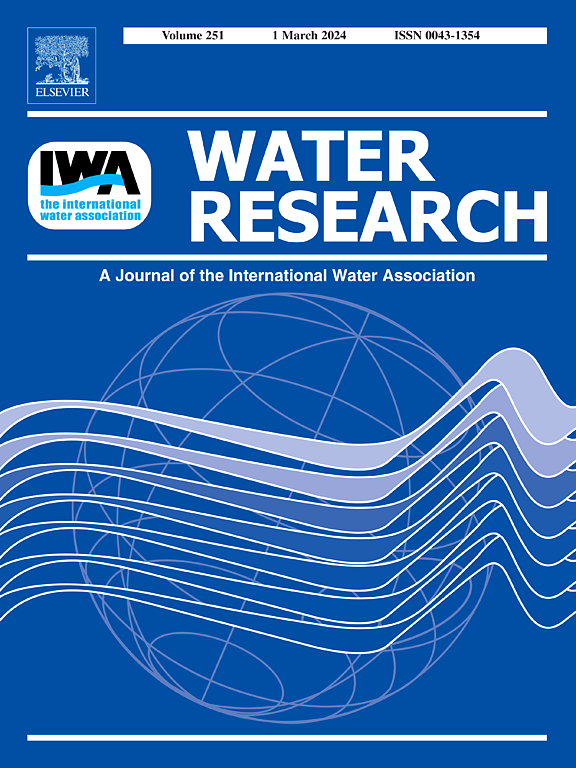破译磁性生物炭中所含生物炭和磁铁矿在垃圾活性污泥厌氧消化过程中提高甲烷产量的协同效应和机制
IF 11.4
1区 环境科学与生态学
Q1 ENGINEERING, ENVIRONMENTAL
引用次数: 0
摘要
在厌氧消化处理活性污泥时,添加导电材料是最广泛的增强策略之一。磁性生物炭(MBC)作为一种复合导电材料,由于其良好的特性,能够提高甲烷产率和产率。然而,生物炭与MBC中所含磁铁矿是否对厌氧消化产生协同效应尚不清楚。研究了半连续厌氧消化模式下MBC中生物炭与磁铁矿的协同作用及其机理。结果表明,生物炭和磁铁矿的共添加对甲烷产量潜力无增效作用,与生物炭和磁铁矿组相比,分别降低2.2%和7.4%。有趣的是,MBC中所含的生物炭和磁铁矿形成了协同效应,与生物炭和磁铁矿组的总和相比,额外提高了5.5%。协同效应来自于高效的水解和产酸阶段,包括可溶性有机物的彻底降解和醋酸的快速转化。MBC还对胞外聚合物质的亲水性和氧化还原性能、参与种间电子转移的酶如细胞色素c的活性以及三磷酸腺苷(ATP)的含量产生协同作用。其中,MBC对细胞色素c和ATP的额外增强率分别为13.1%和19.4%,超过了生物炭和磁铁矿对细胞色素c和ATP的总增强电位,从动力学角度看,MBC所含的生物炭和磁铁矿形成了促进电子跨膜和转移的协同效应。产甲烷性能与微生物电子转移活性的相关系数达到0.96,相应地,MBC中微生物的电子转移活性最高。在微生物群落方面,MBC的添加增加了Peptoclostridium、Anaerolineaceae、Methanosarcina和Methanosaeta等功能微生物和电活性微生物,促进了有机质的转化,建立了直接的种间电子转移产甲烷作用。本研究结果揭示了生物炭与磁性生物炭中所含磁铁矿在促进污泥厌氧消化中的协同作用及其机理,为从废活性污泥中回收生物能源提供了有效的策略,有望促进废水处理中的碳中和。本文章由计算机程序翻译,如有差异,请以英文原文为准。

Deciphering the synergistic effects and mechanisms of biochar and magnetite contained in magnetic biochar for enhancing methane production in anaerobic digestion of waste activated sludge
Adding conductive materials is one of the most extensive enhancement strategies while treating waste activated sludge via anaerobic digestion. Magnetic biochar (MBC), as one composite conductive material, is capable of enhancing methane yield and production rate because of its favorable characteristics. However, whether the synergistic effects formed or not between biochar and magnetite contained in MBC on anaerobic digestion is still unclear. This study investigated the synergistic effects and corresponded mechanisms of biochar and magnetite contained in MBC with semi-continuous anaerobic digestion mode. Results showed that the co-addition of biochar and magnetite performed non-synergistic effects on methane production potential, with decrease ratios of 2.2% and 7.4% respectively compared to that in biochar and magnetite groups. Interestingly, the biochar and magnetite contained in MBC formed synergistic effects, with an extra improvement of 5.5% compared to the sum of those obtained in biochar and magnetite groups. The synergistic effects came from efficient hydrolysis and acidogenesis stages, including the thorough degradation of soluble organic matters and the rapid conversion of acetic acids. MBC also produced synergistic effects on the hydrophilia and redox properties of extracellular polymeric substances, the activities of enzymes involved in interspecies electron transfer like cytochrome c, and the contents of adenosine triphosphate (ATP). Specifically, the enhancement potentials contributed by MBC exceeded the total enhancement potential contributed by biochar and magnetite, with the extra enhancement ratios of 13.1% and 19.4% for cytochrome c and ATP, thus, the biochar and magnetite contained in MBC formed synergistic effects for promoting electron transmembrane and transfer from kinetic aspects. The correlation coefficient between methane production performance and the microbial electron transfer activity reached 0.96, correspondingly, the highest electron transfer activity of microorganism was presented in MBC. As for microbial communities, the functional and electro-active microorganisms were enriched with the addition of MBC, such as Peptoclostridium, Anaerolineaceae, Methanosarcina, and Methanosaeta, which facilitated the conversion of organic matters and established direct interspecies electron transfer methanogenesis. The findings of this study revealed the synergistic effects and mechanisms between biochar and magnetite contained in magnetic biochar in enhancing sludge anaerobic digestion, and provided an effective strategy to recover bioenergy from waste activated sludge, potentially boosting carbon neutrality in wastewater treatment.
求助全文
通过发布文献求助,成功后即可免费获取论文全文。
去求助
来源期刊

Water Research
环境科学-工程:环境
CiteScore
20.80
自引率
9.40%
发文量
1307
审稿时长
38 days
期刊介绍:
Water Research, along with its open access companion journal Water Research X, serves as a platform for publishing original research papers covering various aspects of the science and technology related to the anthropogenic water cycle, water quality, and its management worldwide. The audience targeted by the journal comprises biologists, chemical engineers, chemists, civil engineers, environmental engineers, limnologists, and microbiologists. The scope of the journal include:
•Treatment processes for water and wastewaters (municipal, agricultural, industrial, and on-site treatment), including resource recovery and residuals management;
•Urban hydrology including sewer systems, stormwater management, and green infrastructure;
•Drinking water treatment and distribution;
•Potable and non-potable water reuse;
•Sanitation, public health, and risk assessment;
•Anaerobic digestion, solid and hazardous waste management, including source characterization and the effects and control of leachates and gaseous emissions;
•Contaminants (chemical, microbial, anthropogenic particles such as nanoparticles or microplastics) and related water quality sensing, monitoring, fate, and assessment;
•Anthropogenic impacts on inland, tidal, coastal and urban waters, focusing on surface and ground waters, and point and non-point sources of pollution;
•Environmental restoration, linked to surface water, groundwater and groundwater remediation;
•Analysis of the interfaces between sediments and water, and between water and atmosphere, focusing specifically on anthropogenic impacts;
•Mathematical modelling, systems analysis, machine learning, and beneficial use of big data related to the anthropogenic water cycle;
•Socio-economic, policy, and regulations studies.
 求助内容:
求助内容: 应助结果提醒方式:
应助结果提醒方式:


